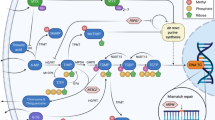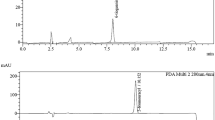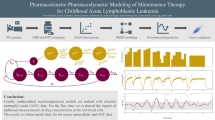Abstract
6-Mercaptopurine (6-MP) is metabolized by thiopurine S-methyltransferase (TPMT), an enzyme subject to genetic polymorphism. We investigated the relationships between the TPMT locus (TPMT activity and genotype) and the pharmacological response to 6-MP during maintenance therapy of 78 children with acute lymphoblastic leukemia (ALL). For each patient, 6-MP dosage, leukocyte counts and occurrence of infectious episodes were monitored on an 8 week basis. Higher 6-MP dosage was associated with higher TPMT activity (P = 0.03) and higher average leukocyte counts (P < 0.01). Eight patients (10%) carrying a TPMT mutant genotype (one homozygous and seven heterozygous) received lower 6-MP doses (average: 48 vs 65 mg/m2/day; P = 0.02) and had on average lower leukocyte counts (2834 vs 3398 cells/mm3; P = 0.003) than patients carrying the wild-type TPMT genotype. Higher occurrence of infectious episodes graded 2 or 3 was correlated with higher 6-MP dosage (P < 0.01) but no difference was observed between TPMT mutants and TPMT wild-type patients. Patients who received 6-MP dosage above the group median (62 mg/m2/day) or having a TPMT activity above the group median (21.5 nmol/h/ml) had a higher percentage of 8 week periods with infectious episodes requiring treatment (34% vs 17% and 33% vs 19%, respectively) than those with 6-MP dose or TPMT activity below the group median (P < 0.01). In the last 25 patients enrolled in the study, steady-state erythrocyte thioguanine nucleotide (TGN) concentrations were associated with lower leukocyte counts (P = 0.01) but not with a higher occurrence of infectious episodes. In contrast, higher steady-state erythrocyte methylmercaptopurine nucleotide (MeMPN) concentrations were associated with higher 6-MP dosage (P < 0.01) and higher occurrence of infectious episodes (P < 0.001). In conclusion, during maintenance therapy of ALL, children with higher TPMT activity receive a higher 6-MP dosage and may have infectious episodes caused by metabolism of 6-MP into methylmercaptopurine nucleotides.
This is a preview of subscription content, access via your institution
Access options
Subscribe to this journal
Receive 12 print issues and online access
$259.00 per year
only $21.58 per issue
Buy this article
- Purchase on SpringerLink
- Instant access to full article PDF
Prices may be subject to local taxes which are calculated during checkout





Similar content being viewed by others
References
Pui CH, Evans WE . Acute lymphoblastic leukemia N Engl J Med 1998 339: 605–615
Elion GB . The purine path to chemotherapy Science 1989 24: 441–447
Warren DJ, Andersen A, Slordal L . Quantitation of 6-thioguanine residues in peripheral blood leukocyte DNA obtained from patients receiving 6-mercaptopurine-based maintenance therapy Cancer Res 1995 55: 1670–1674
Weinshilboum RM, Sladek SL . Mercaptopurine pharmacogenetics: monogenic inheritance of erythrocyte thiopurine methyltransferase activity Am J Hum Genet 1980 32: 651–662
McLeod H, Krynetski E, Relling MV, Evans WE . Genetic polymorphism of thiopurine methyltransferase and its clinical relevance for childhood acute lymphoblastic leukemia Leukemia 2000 14: 567–572
Van Loon JA, Weinshilboum RM . Thiopurine methyltransferase biochemical genetics: human lymphocyte activity Biochem Genet 1982 20: 637–658
McLeod HL, Relling MV, Liu Q, Pui C-H, Evans WE . Polymorphic thiopurine methyltransferase in erythrocytes is indicative of activity in leukemic blasts from children with acute lymphoblastic leukemia Blood 1995 85: 1897–1902
Ferroni MA, Marchi G, Sansone E, Romeo P, Giulianotti PC, Pietrabissa A, Mosca F, Pacifici GM . Variability in the rate of 6-mercaptopurine methylation in the erythrocytes, liver and kidney in an Italian population Eur J Clin Pharmacol 1996 51: 23–29
Szumlanski CL, Honchel R, Scott MC, Weinshilboum RM . Human liver thiopurine methyltransferase pharmacogenetics: biochemical properties, liver-erythrocyte correlation and presence of isozymes Pharmacogenetics 1992 2: 148–159
Evans WE, Horner M, Chu YQ, Kalwinsky D, Roberts WM . Altered mercaptopurine metabolism, toxic effects, and dosage requirement in a thiopurine methyltransferase-deficient child with acute lymphocytic leukemia J Pediatr 1991 119: 985–989
Lennard L, Lilleyman JS, Van Loon J, Weinshilboum RM . Genetic variation in response to 6-mercaptopurine for childhood acute lymphoblastic leukaemia Lancet 1990 336: 225–229
Relling MV, Hancock ML, Rivera GK, Sandlund JT, Ribeiro RC, Krynetski EY, Pui C-H, Evans WE . Mercaptopurine therapy intolerance and heterozygosity at the thiopurine S-methyltransferase gene locus J Natl Cancer Inst 1999 91: 2001–2008
Evans WE, Hon YY, Bomgaars L, Coutre S, Holdsworth M, Janco R, Kalwinsky D, Keller F, Khatib Z, Margolin J, Murray J, Quinn J, Ravindranath Y, Ritchey K, Roberts W, Rogers ZR, Schiff D, Steuber C, Tucci F, Kornegay N, Krynetski EY, Relling MV . Preponderance of thiopurine S-methyltransferase deficiency and heterozygosity among patients intolerant to mercaptopurine or azathioprine J Clin Oncol 2001 19: 2293–2301
Krynetski EY, Fessing MY, Yates CR, Sun D, Schuetz JD, Evans WE . Promoter and intronic sequences of the human thiopurine S- methyltransferase (TPMT) gene isolated from a human PAC1 genomic library Pharm Res 1997 14: 1672–1678
Yates CR, Krynetski EY, Loennechen T, Fessing MY, Tai HL, Pui C-H, Relling MV, Evans WE . Molecular diagnosis of thiopurine S-methyltransferase deficiency: genetic basis for azathioprine and mercaptopurine intolerance Ann Intern Med 1997 126: 608–614
Vilmer E, Suciu S, Ferster A, Bertrand Y, Cave H, Thyss A, Benoit Y, Dastugue N, Fournier M, Souillet G, Manel AM, Robert A, Nelken B, Millot F, Lutz P, Rialland X, Mechinaud F, Boutard P, Behar C, Chantraine JM, Plouvier E, Laureys G, Brock P, Uyttebroeck A, Margueritte G, Plantaz D, Norton L, Francotte N, Gyselinck J, Waterkeyn C, Solbu G, Philippe N, Otten J . Long-term results of three randomized trials (58831, 58832, 58881) in childhood acute lymphoblastic leukemia: a CLCG-EORTC report. Children Leukemia Cooperative Group Leukemia 2000 14: 2257–2266
Jacqz-Aigrain E, Bessa E, Medard Y, Mircheva Y, Vilmer E . Thiopurine methyltransferase activity in a French population: h.p.l.c. assay conditions and effects of drugs and inhibitors Br J Clin Pharmacol 1994 38: 1–8
Medard Y, Nafa S, Jacqz-Aigrain E . Thiopurine methyltransferase activity: new high-performance liquid chromatographic assay conditions J Chromatogr B Biomed Sci Appl 1997 700: 275–277
Dervieux T, Boulieu R . Simultaneous determination of 6-thioguanine and methyl 6-mercaptopurine nucleotides of azathioprine in red blood cells by HPLC Clin Chem 1998 44: 551–555
Relling MV, Hancock ML, Boyett JM, Pui C-H, Evans WE . Prognostic importance of 6-mercaptopurine dose intensity in acute lymphoblastic leukemia Blood 1999 93: 2817–2823
Lennard L, Lilleyman JS . Are children with lymphoblastic leukaemia given enough 6-mercaptopurine? Lancet 1987 2: 785–787
McLeod H, Coulthard SA, Thomas AE, Pritchard S, King DJ, Richards SM, Eden OB, Hall AG, Gibson BE . Analysis of thiopurine methyltransferase variant alleles in childhood actue lymphoblastic leukaemia Br J Haematol 1999 105: 696–700
Schmiegelow K, Bretton-Meyer U . 6-mercaptopurine dosage and pharmacokinetics influence the degree of bone marrow toxicity following high-dose methotrexate in children with acute lymphoblastic leukemia Leukemia 2001 15: 74–79
Dervieux T, Blanco JG, Krynetski EY, Vanin E, Roussel MF, Relling MV . Differing contribution of thiopurine methyltransferase to mercaptopurine versus thioguanine effects in human leukemic cells Cancer Res 2001 61: 5810–5816
Bokkerink JP, Stet EH, De Abreu RA, Damen FJ, Hulscher TW, Bakker MA, van Baal JA . 6-Mercaptopurine: cytotoxicity and biochemical pharmacology in human malignant T-lymphoblasts Biochem Pharmacol 1993 45: 1455–1463
Vogt MH, Stet EH, De Abreu RA, Bokkerink JP, Lambooy LH, Trijbels FJ . The importance of methylthio-IMP for methylmercaptopurine ribonucleoside (Me-MPR) cytotoxicity in Molt F4 human malignant T-lymphoblasts Biochim Biophys Acta 1993 1181: 189–194
Van Loon JA, Weinshilboum RM . Human lymphocyte thiopurine methyltransferase pharmacogenetics: effect of phenotype on 6-mercaptopurine-induced inhibition of mitogen stimulation J Pharmacol Exp Ther 1987 242: 21–26
Ransom JT . Mechanism of action of mycophenolate mofetil Ther Drug Monit 1995 17: 681–684
Acknowledgements
We thank the patients and their parents for participating in this study, and the nurses for taking care of the patients. We also thank Caroline Delnevo for secretarial assistance. This work was supported by grants from AFSSAPS (Agence Française de Sécurité Sanitaire des Produits de Santé) and INSERM (Institut National de la Santé et de la Recherche Médicale).
Author information
Authors and Affiliations
Rights and permissions
About this article
Cite this article
Dervieux, T., Médard, Y., Verpillat, P. et al. Possible implication of thiopurine S-methyltransferase in occurrence of infectious episodes during maintenance therapy for childhood lymphoblastic leukemia with mercaptopurine. Leukemia 15, 1706–1712 (2001). https://doi.org/10.1038/sj.leu.2402259
Received:
Accepted:
Published:
Issue date:
DOI: https://doi.org/10.1038/sj.leu.2402259



